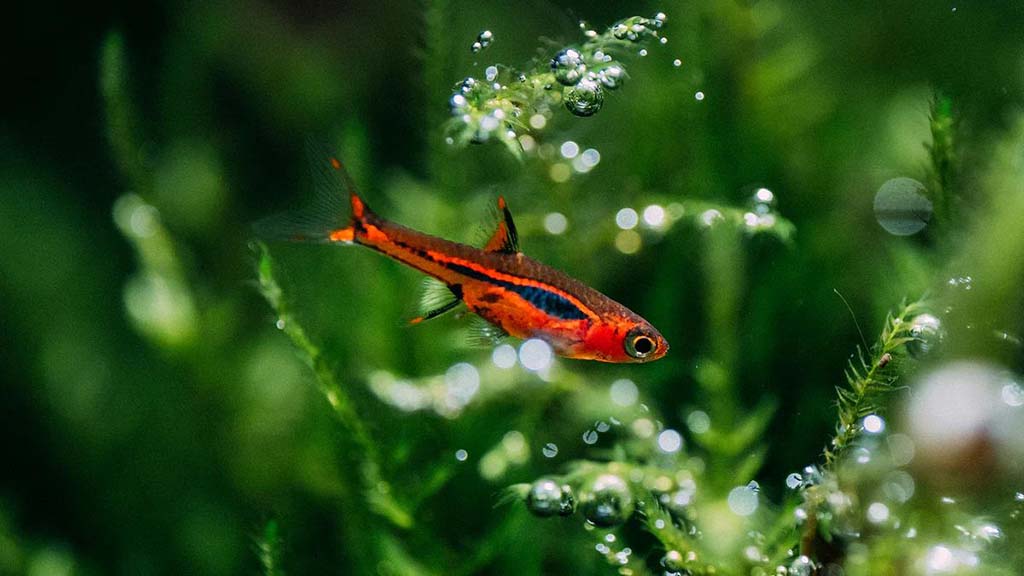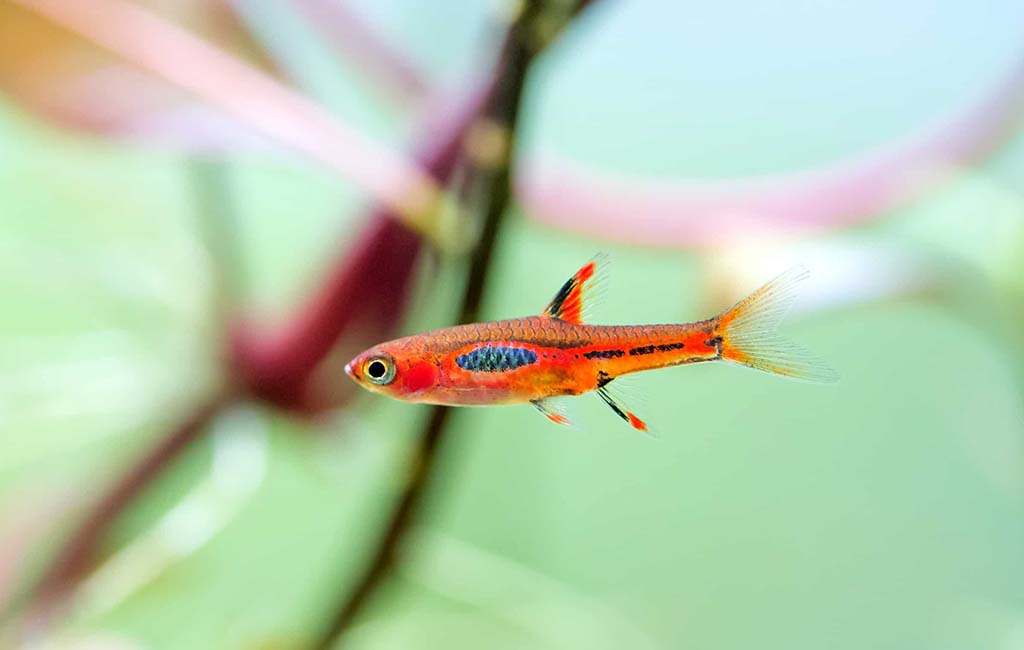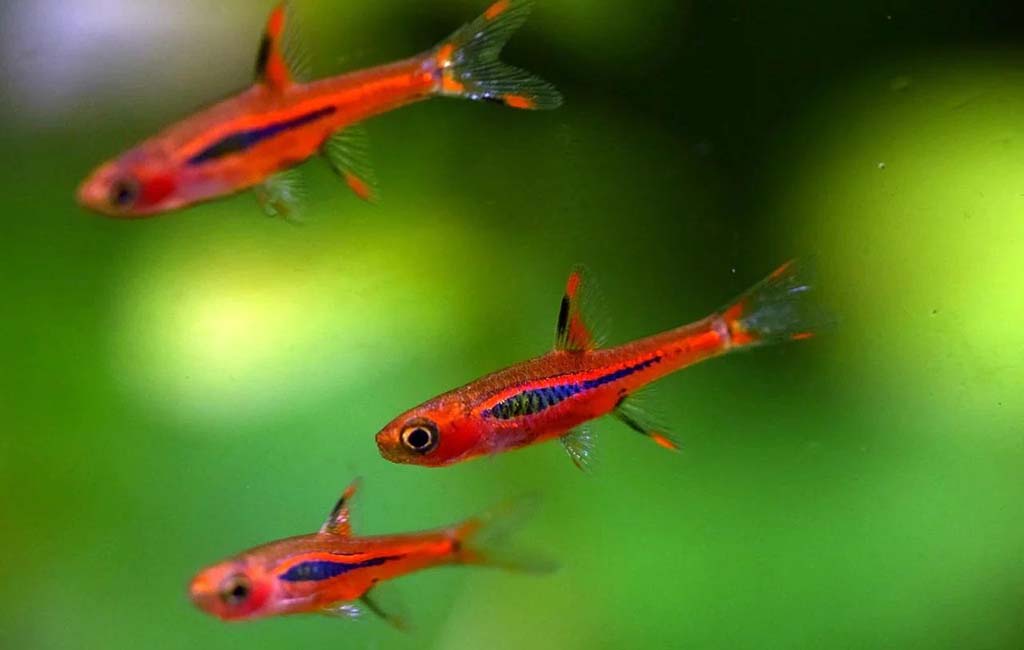Chili rasbora is a unique, colorful, and small fish. It is common among aquarists, especially beginners. They love to keep it due to low care requirements and high tolerance. However, it requires proper take care. In the following, you’ll learn about care, besides its introduction, blackwater, and suitable tank mates for chili rasbora.
Content Table

Chili rasbora
Chili Rasbora
Boraras brigitte, chili rasbora, or mosquito fish, is a small freshwater fish and one of the top choices for aquarists. It has a bright red body with a black line running down it. Its translucent fins with red dots enhance its beauty. This cylindrical fish can grow up to 2cm long. Its small size enables aquarists to keep it in small setups for 4 to 8 years.
Primary Species of Rasbora
Chili rasbora belongs to the rasbora family. It has the following 6 primary species.
| Scientific Name | Common Name |
| Boraras brigittae | Chili Rasbora |
| Boraras merah | Phoenix Rasbora |
| Boraras urophthalmoides | Exclamation Point Rasbora |
| Boraras maculatus | Dwarf Rasbora |
| Boraras micros | Micro Rasbora |
| Boraras naevus | Strawberry Rasbora |
Will Different Chili Rasbora School Together?
Yes, you can keep different Chili Rasbora fish together in a school in a tank. Although, other schools can vary in size and behavior. Here is why and how to keep them in school.
Why to Keep Them in School?
Here are the reasons for keeping them in school.
- Schooling is the natural behavior of chili rasbora. They feel secure and comfortable in a group.
- It enhances the beauty of a tank. Schooling helps to pop out their color and exhibit interesting swimming patterns together.
- Keeping them in school improves their health.
- Schooling avoids stress.
- They show better behavior in school.
How to Keep Chili Rasboras in a School?
A group should have at least 6 to 8 fish. However, a group of 15+ chili rasbora is the best. In larger groups, they show better schooling behavior. The rest of the details for healthy growth are in the Chili Rasbora Care Guide section.
Do Chili Rasboras Need Blackwater?
Blackwater is the natural habitat’s water condition for chili rasboras. However, you can keep them in conditions other than blackwater. Let’s break down blackwater and other optimal water conditions.
What is blackwater?
Blackwater contains tannins, an organic compound that lowers the pathogen level and increases the Chili Rasbora’s vibrant coloration. Tannins cause water coloration, but this doesn’t mean that water is unhealthy or dirty. You can make blackwater by adding peat moss or pellets to your tank.
Other than blackwater
As mentioned, you can keep them in something other than black water. To achieve their living habitat.
- Use slightly acidic water at 5.5 to 7.0 pH.
- Mix RO (Reverse Osmosis) water with tap water to create a little water
- Use a sponge filter, instead of gentle filters.
- Grow Dense vegetation in your tank.

Take care chili rasbora
Chili Rasbora Care Guide
- Select a minimum of a 10-gallon tank for 8 to 10 individuals. A 20-gallon tank is optimal as it can hold some decor objects and plants.
- Use a dark substrate, as it brings out the contrast in the tank.
- Their natural habitat is full of vegetation. Therefore, grow plants in the tank. Anubias, Cryptocoryne species, Dwarf water lilies, java moss, floating plants, etc., are some suitable plant options.
- Set the optimal water parameters.
| Parameter | Value |
| Temperature | 73–82°F |
| pH | 6.0–7.5 |
| Hardness | 4-12 dGH |
Filtration and Lighting
- Use a moderate flow filter because strong currents bring stress among them. However, if you have other species with high flow requirements, use a mesh to reduce the flow rate.
- They require low lighting. Highlights can bring stress to them.
Diet
- Chili rasbora is a carnivorous fish. They love to eat small prey, i.e., insects, larvae, and worms. However, in the tank, you can feed them on live or dry food with specialized chili rasbora flakes pellets. Maintain variety in food.
- Feed 1 to 2 times a day.
Water Change
- Change 20% water each week.
Breeding
- Chili rasboras are continuous spawners. Therefore, it is optimal to prepare a separate breeding tank.
- Add dense vegetation in the tank.
- Add faux grass for egg scattering.
- After laying eggs, remove adults from the tank.
- Hatching takes 2 days.
- Feed yolk sac to fry for the first 10 days.
- After 10 days, feed them on microworms.
Health Tips
- Always feed your chili rasbora quality food and keep them in stable water, and a clean environment. Otherwise, they will fall for Ich.
- Closely observe your fish. Transfer the diseased fish to the quarantine tank for proper medication.
- Always quarantine the new fish, before introducing them into the main tank.

tank mates for chili rasbora
Tank Mates for Chili Rasbora
Chili rasbora are peaceful fish and can live with peaceful species. Keep them with the same size, peaceful, and bottom dwellers. There are numerous suitable tank mates that you can keep with them.
| Neon Tetras | Neon Green Rasboras | Rosy Loaches | Otocinclus Catfish | Snails |
| Ember Tetras | Lambchop Rasboras | Dwarf Cory Catfish | Kuhli Loaches | Shrimps |
Parting Thoughts
Chili rasbora, or mosquito rasbora, is an Indonesian black water species and a hot favorite among aquarists. It is a schooling, easy-to-care-for, and peaceful fish. It exhibits different, unique swimming patterns and pops out striking colors when it is in a group of at least 8 to 10. You can enjoy its color by keeping it in a community tank.



Leave a comment